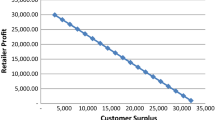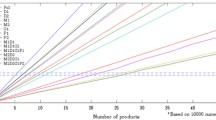Abstract
We present a new mixed-integer programming (MIP) approach to study certain retail category pricing problems that arise in practice. The motivation for this research arises from the need to design innovative analytic retail optimization techniques at Oracle Corporation to not only predict the empirical effect of price changes on the overall sales and revenue of a category, but also to prescribe optimal dynamic pricing recommendations across a category or demand group. A multinomial logit nonlinear optimization model is developed, which is recast as a discrete, nonlinear fractional program (DNFP). The DNFP model employs a bi-level, predictive modeling framework to manage the empirical effects of price elasticity and competition on sales and revenue, and to maximize the gross-margin of the demand group, while satisfying certain practical side-constraints. This model is then transformed by using the Reformulation–Linearization Technique in tandem with a sequential bound-tightening scheme to recover an MIP formulation having a relatively tight underlying linear programming relaxation, which can be effectively solved by any commercial optimization software package. We present sample computational results using randomly generated instances of DNFP having different constraint settings and price range restrictions that are representative of common business requirements, and analyze the empirical effects of certain key modeling parameters. Our results indicate that the proposed retail price optimization methodology can be effectively deployed within practical retail category management applications for solving DNFP instances that typically occur in practice.
Similar content being viewed by others
References
Ben-Akiva M., Lerman S.: Discrete Choice Analysis: Theory and Application to Travel Demand. MIT Press, Cambridge (1985)
Elmaghraby W., Keskinocak P.: Dynamic pricing in the presence of inventory considerations: research overview, current practices and future directions. Manage. Sci. 49(10), 1287–1309 (2003)
Guadagni P.M., Little J.D.C.: A logit model of brand choice calibrated on scanner data. Mark. Sci. 11, 372–385 (1983)
Hanson W., Martin K.: Optimizing multinomial logit profit functions. Manage. Sci. 42(5), 992–1003 (1996)
McFadden D.: Conditional logit analysis of qualitative choice analysis. In: Zarembka, P. (ed.) Frontiers in Econometrics, Academic Press, New York (1974)
Reibstein D.J., Gatignon H.: Optimal product line pricing: the influence of elasticities and cross-elasticities. J. Mark. Res. 21, 259–267 (1984)
Silva-Risso, J., Ionova, I.: A nested logit model of product and transaction-type choice for planning automakers’ pricing and promotions. Mark. Sci. (to appear) (2008)
Sherali H.D., Adams W.P.: A Reformulation–Linearization Technique for Solving Discrete and Continuous Nonconvex Problems. Kluwer, Dordrecht (1999)
Tawarmalani M., Ahmed S., Sahinidis N.V.: Global optimization of 0-1 Hyperbolic Programs. J. Global Optim. 24, 385–417 (2002)
Train K.E.: Qualitative Choice Analysis: Theory, Econometrics, and an Application to Automobile Demand. MIT Press, Cambridge (1985)
Tse Y.K.: A diagnostic test for the multinomial logit model. J. Bus. Econ. Stat. 5(2), 283–286 (1987)
Author information
Authors and Affiliations
Corresponding author
Rights and permissions
About this article
Cite this article
Subramanian, S., Sherali, H.D. A fractional programming approach for retail category price optimization. J Glob Optim 48, 263–277 (2010). https://doi.org/10.1007/s10898-009-9491-2
Received:
Accepted:
Published:
Issue Date:
DOI: https://doi.org/10.1007/s10898-009-9491-2




